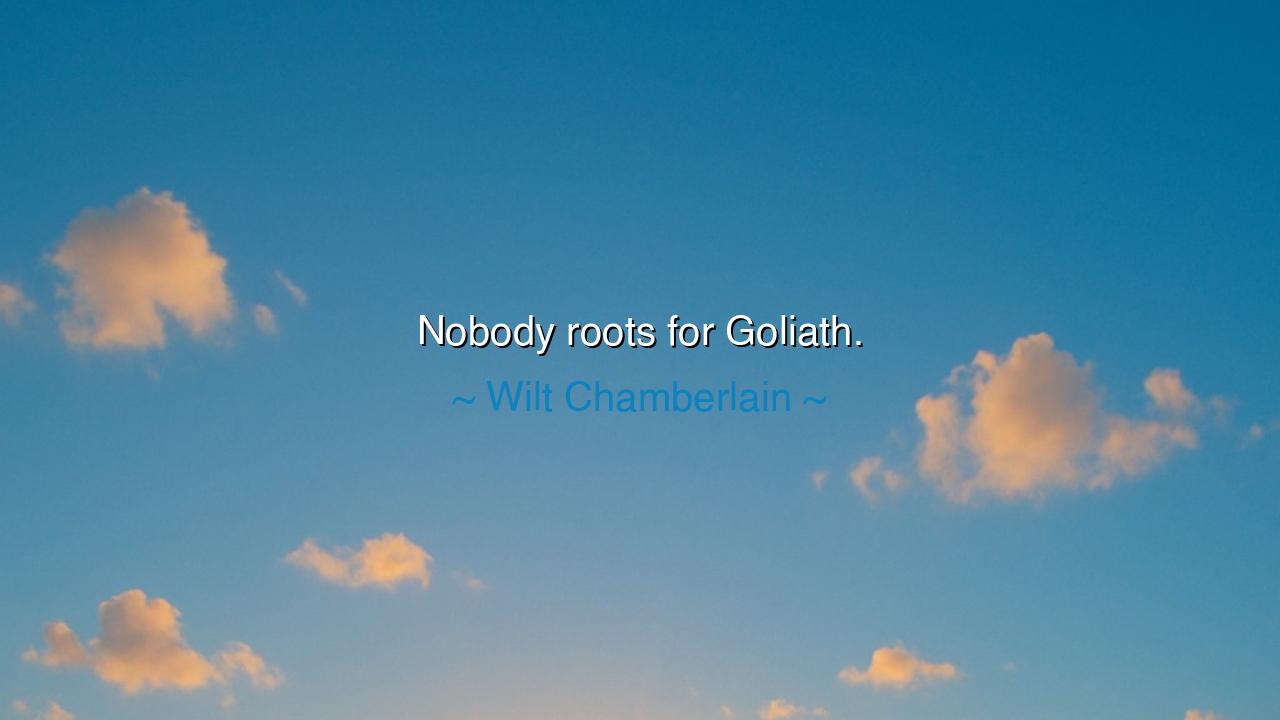
Nobody roots for Goliath.






Hearken, O seeker of wisdom, to the words of Wilt Chamberlain, the towering figure of the court, who declared: “Nobody roots for Goliath.” In this succinct phrase lies a timeless truth, echoed in the tales of antiquity: the mighty, the imposing, the seemingly invincible, though awe-inspiring, often stand alone. Admiration may attend them, but the heart of the world beats for the underdog, the challenger, the David who dares to confront the giant. Power and size alone do not summon the devotion of the masses; courage in the face of adversity does.
From the earliest chronicles, humanity has revered those who defy the overwhelming, not those who dominate effortlessly. The story of David and Goliath, preserved through centuries, exemplifies this truth: the giant, formidable and feared, inspired dread but not love; it was the humble shepherd, armed with courage and faith, who captured the hearts of men. Chamberlain’s reflection echoes this ancient wisdom onto the modern arena, reminding us that admiration is hollow when it is only for sheer force.
Chamberlain himself, a man of prodigious height and unmatched talent, understood the solitude of being Goliath. On the basketball court, his dominance was undeniable, yet the crowd, the fans, often sought to cheer against him rather than with him. His towering presence invited awe, but rarely empathy. In this lies a lesson beyond sport: those who stand above others by power alone may be isolated, their victories celebrated in fear or envy rather than shared joy.
History is rich with such examples. Consider the Roman emperors, whose vast legions and immense wealth commanded obedience, yet often failed to inspire genuine loyalty. The masses revered their might, yet true affection and devotion went to figures who dared stand with the people, who faced adversity alongside them. Power, without shared struggle, engenders respect but not the warmth of collective rooting. Goliath commands, David inspires.
Yet the wisdom of Chamberlain’s observation is not despair but illumination. To be Goliath is to be conscious of the responsibility that comes with strength, to temper might with humility, and to seek connection beyond sheer dominance. The true measure of influence is not in being feared, but in being supported, admired, and cherished—not merely for what one can do, but for what one shares and sacrifices alongside others.
This principle extends beyond sport or battle. In leadership, in art, in science, those who wield power without empathy or collaboration may achieve great feats, yet remain isolated. Consider the story of Nikola Tesla: a mind capable of astonishing inventions, yet often misunderstood and underappreciated, struggling for recognition while others rooted for figures who fought familiar odds with relatable courage. The lesson is clear: human hearts align with courage, perseverance, and connection, not sheer might.
The teaching emerges with clarity: seek to temper your strength with humility, to pair skill with empathy, and to remember that the hearts of many favor the underdog and the relatable over the invincible. Practical actions follow: foster collaboration, share your journey with others, face challenges visibly and courageously, and celebrate not only your victories but the struggles that accompany them. In doing so, your influence grows not through awe alone, but through allegiance and admiration.
Walk forward, O listener, as Chamberlain strode across the court, aware of the solitude that Goliath bears, yet striving to connect and inspire beyond mere dominance. Let his wisdom echo: might alone does not win hearts, and true greatness is measured not only in power but in the ability to inspire, to humble oneself, and to invite others to root for the journey, not only the triumph.






AAdministratorAdministrator
Welcome, honored guests. Please leave a comment, we will respond soon